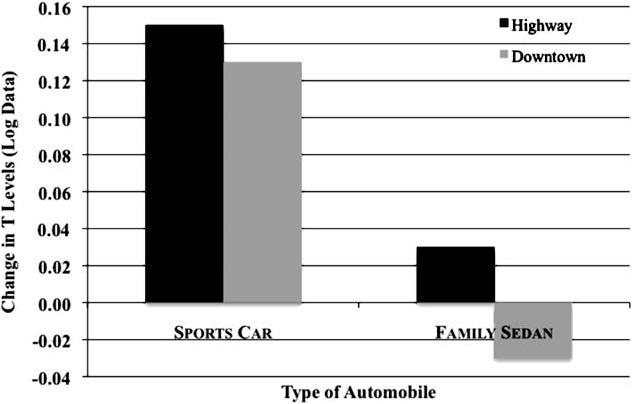I put up what I thought was an amusing and not especially original post on Wednesday afternoon that described a study showing that men who drove a new Porsche — but not an old Camry — responded with increased testosterone levels. It got picked up by something called Hacker News and was on the top of their list of hot items for hours (I don't really understand how this thing works). The result was that it drove 5000 or 6000 hits to my blog and generated 35 comments there. By now, after some four years of blogging, I have learned that it is impossible to know what will take off. And although it is fun when it happens, I have learned that when I stick to what feels interesting and authentic to me, I have the most fun and learn the most. But based on reactions to my two testosterone posts, this is clearly something people seem to be interested in and I confess the research on it intrigues and bewilders me.
So, to add to my posts here and here, I have one more study about cars and T levels to add to the mix. Following a link that appeared in one of the Hacker news comments, there was a related study described over Telegraph.com in the UK, headlined Sound of a sports care engine arouses women. Here is how the study is described "The 40 participants listened to the recordings of a Maserati, a Lamborghini
and a Ferrari, along with a Volkswagon Polo, before having a saliva specimen
collected." I have much less information about the nuances of this research than the other two studies, but on the face of it, the evidence seems to be that women respond more strongly than men to the sound of cars and to different cars. Note this excerpt:
The results found 100 per cent of female participants had a significant
increase in testosterone secretion after listening to the Maserati, compared
to only half for men.Men fared better at the sound of a Lamborghini, with 60 per cent showing a
testosterone increase. Psychologist David Moxon, who conducted the study commissioned by motor
insurer Hiscox, said: "We saw significant peaks, particularly in women."
"The roar of a luxury car engine does cause a primeval physiological
response." He added the sound of an average car engine actually led to a decreased level
of testosterone.
I promise this is my last post on T levels for a long time. I just couldn't resist this one.
P.S. Check out Ellie's comment. She raises excellent points about the legitimacy of this research. I am trying to contact the David Moxon to see if he can share the original data and research report with us, l hope he answers. Once again, to be clear, the other two testosterone studies were published in a top peer-reviewed journal, and while they are imperfect, they are carefully done, the authors are careful not to overstate claims, and they acknowledge flaws and alternative explanations for their findings.
